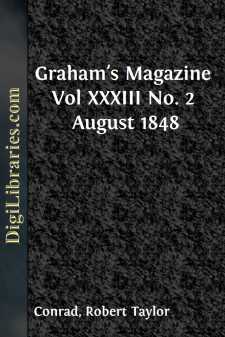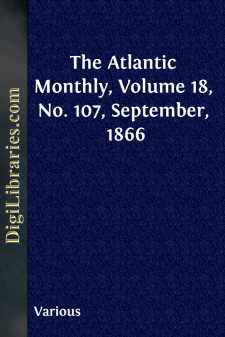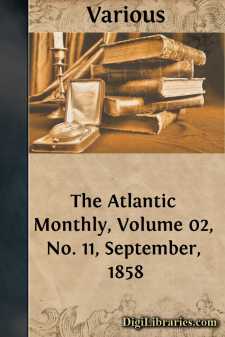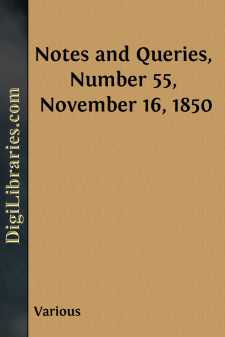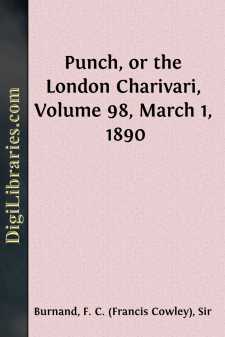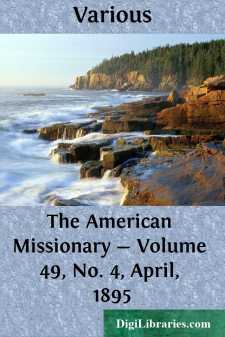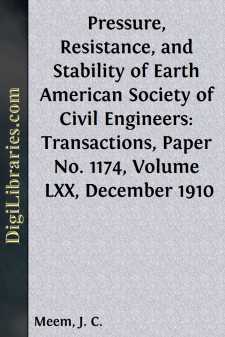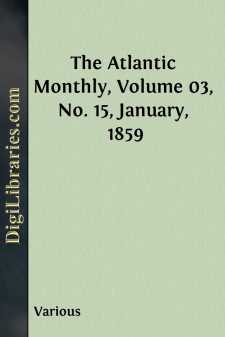Periodicals
- Art 27
- Children's periodicals 59
- Entertainment 5
- Food/Wine 2
- Games/Humor 455
- General 661
- Health 1
- History 53
- House/Home 1
- Regional 62
- Science/Nature 118
- Transportation 10
Periodicals Books
Sort by:
This remarkable woman was not only one of the first writers of her country, but she deserves to be ranked with the most celebrated persons of her sex who have lived in any nation or age. Within the last century woman has done more than ever before in investigation, reflection and literary art. On the continent of Europe an Agnesi, a Dacier and a Chastelet have commanded respect by their learning, and a...
more...
by:
Various
AD PUELLAM. ["Detective cameras have become favourite playthings with ladies of fashion."—Ladies' Paper.] You used to prate of plates and prints And "quick developers" before, In spite of not unfrequent hints That these in time become a bore; But then this photographic craze Seemed little but a foolish fad, While now its very latest phase Appears to me distinctly bad. Since even...
more...
by:
Various
The sickness of the nation not being unto death, we now begin to number its advantages. They will not all be numbered by this generation; and as for story-tellers, essayists, letter-writers, historians, and philosophers, if their "genius" flags in half a century with such material as hearts, homes, and battle-fields beyond counting afford them, they deserve to be drummed out of their respective...
more...
by:
Various
ELOQUENCE. It is the doctrine of the popular music-masters, that whoever can speak can sing. So, probably, every man is eloquent once in his life. Our temperaments differ in capacity of heat, or we boil at different degrees. One man is brought to the boiling point by the excitement of conversation in the parlor. The waters, of course, are not very deep. He has a two-inch enthusiasm, a pattypan...
more...
by:
Various
NOTES. AUTHORSHIP OF "HENRY VIII." In returning to the question of the authorship of Henry VIII., I am anxious to remove a misconception under which MR. SPEDDING appears to labour relative to the purport of a remark I made in my last communication to you (Vol. ii., p. 198.) on this subject. As we appear to be perfectly agreed as to the reasons for assigning a considerable portion of this play...
more...
"Though cold the coxcomb, and though coarse the boor, Though dulness haunts the rich and pain the poor, In this colossal city, Yet London is not Rome, O Shade!" I said. "A later Juvenal should not find her dead To purity and pity." "Satire, of shames and follies in sole quest, Is a one-eyed divinity at best," My guide responded, slowly. "The tale of Zoïlus hath its moral...
more...
by:
Various
THE AMERICAN MISSIONARYVol.XLIX.APRIL, 1895.No.4.Our debt is large, but we rejoice to say that during the last three months it has been slowly diminishing. It reached its highest point November 30—$82,425.58. December 31 it was $82,032.07; January 31, $79,502.77; February 28, $76,431.49. The cause of this decrease varies in the different months. Sometimes the legacies are in advance, and sometimes...
more...
by:
J. C. Meem
With discussion by Messrs. T. Kennard Thomson, Charles E. Gregory, Francis W. Perry, E.P. Goodrich, Francis L. Pruyn, Frank H. Carter, and J.C. Meem. In the final discussion of the writer's paper, "The Bracing of Trenches and Tunnels, With Practical Formulas for Earth Pressures," certain minor experiments were noted in connection with the arching properties of sand. In the present paper it...
more...
by:
William Curtis
[1] Iris Persica. Persian Iris. Class and Order. Triandria Monogynia. Generic Character. Corolla 6-partita: Petalis alternis, reflexis. Stigmata petaliformia. Specific Character and Synonyms. IRIS Persica corolla imberbi, petalis interioribus brevissimis patentissimis. Linn. Syst. Vegetab. p. 79. Sp. Pl. p. 59. IRIS bulbosa præcox minus odora Persica variegata. Moris. hist. 2. p. 357. XIPHIUM...
more...
by:
Various
OLYMPUS AND ASGARD. How remote from the nineteenth century of the Christian era lies the old Homeric world! By the magic of the Ionian minstrel's verse that world is still visible to the inner eye. Through the clouds and murk of twenty centuries and more, it is still possible to catch clear glimpses of it, as it lies there in the golden sunshine of the ancient days. A thousand objects nearer in...
more...


